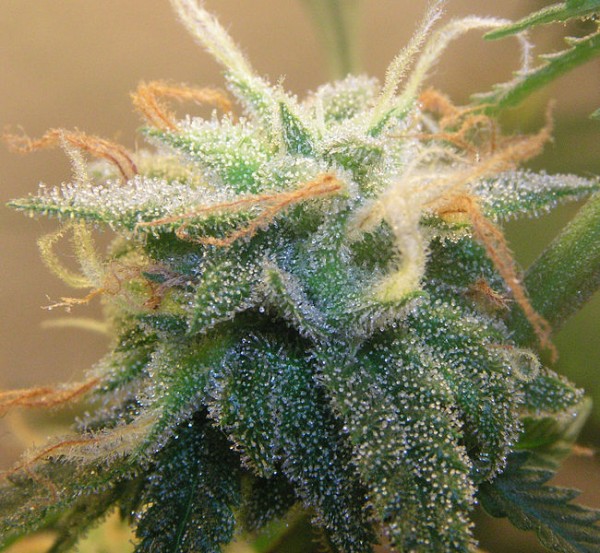Dr. Weeks’ Comment: Marijuana, like any drug, can be abused …. but its medicinal benefits ought not be ignored out of fear or ignorance. My concern with pot is that it can have the detrimental effect of lowering will forces and motivation in young adults effectively robbing them of a productive future. But that abuse doesn’t disqualify the plant as a potent source of medicine. Did you know that patents exist for the medical use of marijuana to treat dementia , to treat IgE related allergies, and also for treating cancer ? Here is a handout given to patients on this topic –watch the videos.
New research shows marijuana compounds do fight cancer
The bracts (small leaves) surrounding a cluster of Cannabis sativa flowers are coated with cannabinoid-laden trichomes. (Photo: Wikimedia Commons)
Debate is just beginning in Washington over how medical marijuana will be grown and distributed now that the rules for the recreational market are established. Meanwhile, research into medical benefits of compounds within the cannabis plant continues to show effectiveness.
Effectiveness against pain in its many forms and other side effects of major diseases – or the palliative side of marijuana use – have been pretty well established, but can marijuana directly take on a disease as big, scary and deadly as cancer?
“What we’ve shown using just a few of these (cannabis) compounds is that the effects against cancer are really profound. They really are,” said Dr. Wai Liu, a senior research fellow at St George’s University of London.
Anticancer success
Quick note: Cannabinoids are the chemicals in marijuana that have effects in the body, some have psychoactive (or make you high) effects such as THC, and others such as CBD don’t have psychoactive effects but do interact with the body’s “cannabinoid receptors.” There are more than 85 “cannabinoids” in marijuana.
Liu’s most recent published research “explored the activity of six cannabinoids, used both alone and in combination in leukaemic cells.” The research was published in Anticancer Research: International Journal of Cancer Research and Treatment.
He said the anticancer activity of THC has been “known for sometime” but that THC’s psychoactive effect or tendency to get you high limits its use as a cancer-fighting agent. That’s partly due to the negative social stigma about getting high and, of course, not everyone wants to experience a high.
So, he set out to explore the cancer fighting ability of other cannabinoids that don’t get you high.
“We have shown that these six other agents that lack psychoactivity are also just as effective as an anti-cancer agent,” he said. Chief among the six was cannabidiol or CBD.
His research found that “if you were to use one or two of these on their own, that would inhibit cancer growth. However, we’re clinicians. Not only do we want cancer to not grow, but we’re also wanting to see cell death.”
He said his study showed that once these cells are taken out of the treatment solution causing them to stop growing, the cells die from the toxic effects of the treatment. Liu believes his results are strong enough that he hopes to start clinical trials involving humans in 12 to 18 months.
“We’ve clearly shown in the lab that these drugs work,” he said.
Key technical paragraph from the study:
“This study was undertaken to explore the cytotoxic effect of a number of prominent cannabinoids on two leukaemia cell lines, and had a particular interest in examining the impact of drug-scheduling in determining activity. The most significant finding of the current study is that removing cells from medium-containing cannabinoids, and allowing them to recover in drug-free medium results in a dramatic increase in cytotoxicity. Furthermore, there was value in using some of the cannabinoids concomitantly, as this combination method results in additive/mildly synergistic interactions.”
So, smoke it up to cure cancer?
“That’s one thing I’ve been trying to fight against for quite a few years now,” Liu said.
The bottom line here, he says, is that when all of the chemicals are burned or eaten at once – the usual way cannabis is used medicinally and recreationally – the positive, cancer-fighting effects could be lost in the mix.
“I’m not saying that cannabis itself, as the whole plant, won’t work. We just don’t know. We need a lot more studies and a lot more trials to study that fact. However, what we have (now) … is that these purified forms do have an effect and if it does work it could save patients,” he said.
“We need to distinguish what is useful in marijuana and what is not. And once we understand that, we’ll have a better understanding of steps forward for how to treat patients with particular disease.”
Jake Ellison can be reached at 206-448-8334 or jakeellison@seattlepi.com.


